|
|
|
Sort Order |
|
|
|
Items / Page
|
|
|
|
|
|
|
| Srl | Item |
| 1 |
ID:
086760
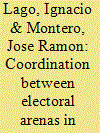

|
|
|
|
|
| Publication |
2009.
|
| Summary/Abstract |
This article shows the existence of a coordination dilemma in multilevel countries that hold elections for different parliaments, at different territorial levels and with different electoral rules. With evidence from Spain, the analysis identifies interaction or contamination effects between national and subnational electoral arenas that generate, just as in most mixed-member electoral systems, a centrifugal force that increases the number of electoral parties in national elections. The incentives that solve this coordination dilemma faced by small regional or local parties are theoretically discussed and empirically tested.
|
|
|
|
|
|
|
|
|
|
|
|
|
|
|
|
| 2 |
ID:
086763


|
|
|
|
|
| Publication |
2009.
|
| Summary/Abstract |
This article shows the existence of a coordination dilemma in multilevel countries that hold elections for different parliaments, at different territorial levels and with different electoral rules. With evidence from Spain, the analysis identifies interaction or contamination effects between national and subnational electoral arenas that generate, just as in most mixed-member electoral systems, a centrifugal force that increases the number of electoral parties in national elections. The incentives that solve this coordination dilemma faced by small regional or local parties are theoretically discussed and empirically tested.
|
|
|
|
|
|
|
|
|
|
|
|
|
|
|
|
| 3 |
ID:
086759
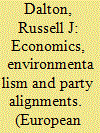

|
|
|
|
|
| Publication |
2009.
|
| Summary/Abstract |
'We are neither Left nor Right, we are out in front' was the mantra of the environmental movement in the 1970s and early 1980s. This research examines the relationship between the traditional left/right economic cleavage and the environmental cleavage in structuring party competition in advanced industrial democracies. It begins by discussing the theoretical rationale for the separation of environmentalism from the traditional economic cleavage, and utilises new expert data to describe the evolution of party positions between 1989 and 2002-2003. An initially strong relationship between party positions on both dimensions in 1989 has strengthened over time. The convergence occurs largely because of changes by Green parties and by the addition of new parties that define themselves on both dimensions. This points to the ability of democratic party systems to integrate a new political cleavage, and the process of integration. However, leftist parties still continue to diverge with respect to how they respond to the environmental cleavage.
|
|
|
|
|
|
|
|
|
|
|
|
|
|
|
|
| 4 |
ID:
086762
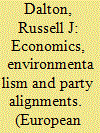

|
|
|
|
|
| Publication |
2009.
|
| Summary/Abstract |
'We are neither Left nor Right, we are out in front' was the mantra of the environmental movement in the 1970s and early 1980s. This research examines the relationship between the traditional left/right economic cleavage and the environmental cleavage in structuring party competition in advanced industrial democracies. It begins by discussing the theoretical rationale for the separation of environmentalism from the traditional economic cleavage, and utilises new expert data to describe the evolution of party positions between 1989 and 2002-2003. An initially strong relationship between party positions on both dimensions in 1989 has strengthened over time. The convergence occurs largely because of changes by Green parties and by the addition of new parties that define themselves on both dimensions. This points to the ability of democratic party systems to integrate a new political cleavage, and the process of integration. However, leftist parties still continue to diverge with respect to how they respond to the environmental cleavage.
|
|
|
|
|
|
|
|
|
|
|
|
|
|
|
|
| 5 |
ID:
086761
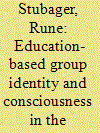

|
|
|
|
|
| Publication |
2009.
|
| Summary/Abstract |
The increasing importance of New Politics or authoritarian-libertarian values to electoral behaviour in advanced Western industrial democracies and the previously documented strong link between such values and educational attainment indicates that, contrary to the claims of some New Politics theorists, the ideological conflict is anchored in the social structure - in particular in educational groups. For this interpretation to be warranted, however, it should be possible to document the existence of education-based group identity and group consciousness related to the value conflict. The article develops indicators of the core variables out of Social Identity Theory. Based on a unique survey from Denmark, which includes the new set of indicators, the analyses show that members of the high and low education groups have developed both group identity and consciousness reflecting a conflict between the groups and that these factors are related to authoritarian-libertarian values. The results are interpreted as reflecting a relationship of dominance, which supports the view that the ideological conflict is structurally anchored.
|
|
|
|
|
|
|
|
|
|
|
|
|
|
|
|
| 6 |
ID:
086764
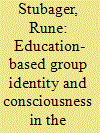

|
|
|
|
|
| Publication |
2009.
|
| Summary/Abstract |
The increasing importance of New Politics or authoritarian-libertarian values to electoral behaviour in advanced Western industrial democracies and the previously documented strong link between such values and educational attainment indicates that, contrary to the claims of some New Politics theorists, the ideological conflict is anchored in the social structure - in particular in educational groups. For this interpretation to be warranted, however, it should be possible to document the existence of education-based group identity and group consciousness related to the value conflict. The article develops indicators of the core variables out of Social Identity Theory. Based on a unique survey from Denmark, which includes the new set of indicators, the analyses show that members of the high and low education groups have developed both group identity and consciousness reflecting a conflict between the groups and that these factors are related to authoritarian-libertarian values. The results are interpreted as reflecting a relationship of dominance, which supports the view that the ideological conflict is structurally anchored.
|
|
|
|
|
|
|
|
|
|
|
|
|
|
|
|
| 7 |
ID:
086766
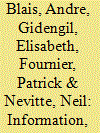

|
|
|
|
|
| Publication |
2009.
|
| Summary/Abstract |
This article assesses the aggregate effect of information shortfall on the outcome of the last six Canadian elections. Building on Bartels' analysis, the authors find an information effect in three of the six elections examined, and in each case the information gap benefits the Liberal Party. That finding raises the question: why does information matter in some contexts but not in others? It is argued in this article that the information gap is related to lack of visibility. When and where all political parties have some degree of visibility, the less informed vote like the better informed, but when and where a party is hardly visible, the less informed are less likely to support that party. The less informed appear to consider a smaller set of options when they decide how to vote.
|
|
|
|
|
|
|
|
|
|
|
|
|
|
|
|
| 8 |
ID:
086765
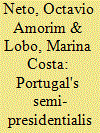

|
|
|
|
|
| Publication |
2009.
|
| Summary/Abstract |
This article analyses the policy-making role of Portugal's heads of state in the period 1976-2006. Not only is Portugal rarely studied in the English language comparative literature, but there is no consensus concerning the proper definition of the country's system of government, whether it is semi-presidential or parliamentary. This article presents new data on the Portuguese president's role in the following areas: cabinet appointment and dismissal; parliamentary dissolution; ministerial appointments; referral of legislative bills to judicial review; veto powers; and agenda-setting through going-public tactics. It is concluded that the president's role in the policy process has never been irrelevant. While the 1982 constitutional reform did eliminate the possibility of undisguised presidential government, presidents have continued to be important in policy making, particularly due to use of their veto and dissolution powers. Therefore, the article argues that Portugal has remained solidly semi-presidential.
|
|
|
|
|
|
|
|
|
|
|
|
|
|
|
|
| 9 |
ID:
086768


|
|
|
|
|
| Publication |
2009.
|
| Summary/Abstract |
Since Tocqueville's seminal writings, voluntary associations have been proclaimed to be schools of democracy. According to this claim, which regained popularity during the 1990s, involvement in voluntary associations stimulates political action. By participating in these associations, members are socialised to become politically active. Supposedly, having face-to-face contact with other members induces civic mindedness - the propensity to think and care more about the wider world. Participating in shared activities, organising meetings and events, and cooperating with other members are claimed to induce civic skills and political efficacy. Over the years, many authors have elaborated on these ideas. This article offers a systematic examination of the neo-Tocquevillian approach, putting the theoretical ideas to an empirical test. It offers a critical overview of the literature on the beneficial role of voluntary associations and dissects it into five testable claims. Subsequently, these claims are tested by cross-sectional, hierarchical analyses of 17 European countries. The authors conclude that the neo-Tocquevillian theory faces serious lack of empirical support. In line with the expectations, they find a strong, positive correlation between associational involvement and political action. Moreover, this correlation is positive in all countries under study. However, more informative hypotheses on this correlation are falsified. First, the correlation is stronger for interest and activist organisations than for leisure organisations. Second, passive (or 'checkbook') members show much higher levels of political action than non-involved, whereas the additional effects of active participation are marginal. Third, the correlation between associational involvement and political action is not explained by civic skills and civic mindedness. In sum, the authors find no evidence for a direct, causal relation between associational involvement and political action. The socialisation mechanism plays a marginal role at best. Rather, this article's findings imply that selection effects account for a large part of the correlation between associational involvement and political action. The conclusion reached therefore is that voluntary associations are not the schools of democracy they are proclaimed to be, but rather pools of democracy.
|
|
|
|
|
|
|
|
|
|
|
|
|
|
|
|
|
|
|
|
|